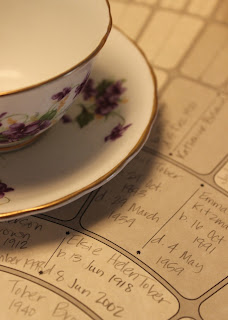Today, I received a great surprise from fellow geneablogger, Jana Last, author of Jana’s Genealogy and Family History Blog. I have learned to appreciate Jana’s blog a great deal, and enjoy reading it on a regular basis.
On 9 January 2013, she posted an article entitled, “Three Blog Awards, Kindly Given,” in which she stated that she had been nominated for three different awards at the close of 2012, and my only thought was that this was so well deserved.
As I continued to read, I was humbled and honored to see that she had chosen my blog, Ancestral Breezes, as one of her nominations for the “Blog of the Year 2012” Award.

It may seem like a simple gesture, but truly, I consider it great praise when another blogger and genealogist compliments my work. As a “transitioning” genealogist professional, I have spent countless hours in the past twelve months trying to find ways in which to turn my passion into a career path; I am truly astounded at the pride such an action invokes.
Part of this process is selecting my own nominations for ‘Blog of the Year 2012’. Thankfully, I am not limited in any way, so here are a couple of my favorites. These are people from whom I have learned, who have had an influence or impact on my professional world, or simply those that have conveyed true emotion and the spirit of collaboration in their blogs.
- Dan Curtis, “Professional Personal Historian”
- Lynn Palermo, “The Armchair Genealogist”
- The In-Depth Genealogist Blog (full disclosure, I am a contributor to this blog. The other authors, and the editors, have taught me a great deal, so this nomination goes to the collaboration effort as a whole.)
- Stephanie Pitcher Fishman “Corn & Cotton Genealogy Blog”
- Mariann Regan "Into the Briar Patch"
My thanks go out to all geneabloggers. What an incredible year it has been! I have learned much, laughed a great deal, and even cried some at the stories you tell, the personalities you bring forth in your writing.
Raise a glass, friends, 2013 is going to be amazing. We will make it that way together.
Here’s the skinny on this Award:
1 Select the blog(s) you think deserve the ‘Blog of the Year 2012’ Award
2 Write a blog post and tell us about the blog(s) you have chosen – there’s no minimum or maximum number of blogs required – and ‘present’ them with their award.
3 Please include a link back to this page ‘Blog of the Year 2012’ Award – http://thethoughtpalette.co.uk/our-awards/blog-of-the-year-2012-award/ and include these ‘rules’ in your post (please don’t alter the rules or the badges!)
4 Let the blog(s) you have chosen know that you have given them this award and share the ‘rules’ with them
5 You can now also join our Facebook group – click ‘like’ on this page ‘Blog of the Year 2012’ Award Facebook group and then you can share your blog with an even wider audience
6 As a winner of the award – please add a link back to the blog that presented you with the award – and then proudly display the award on your blog and sidebar … and start collecting stars…
















